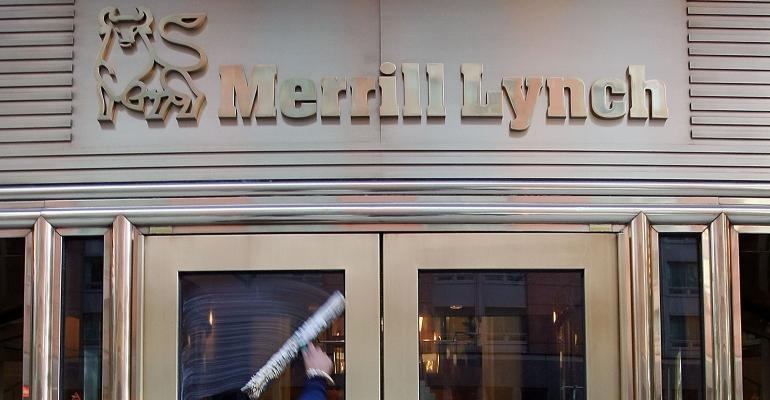Merrill Lynch will pay more than $8 million in restitution for failing to supervise registered representatives who recommended early rollovers of unit investment trusts (UITs) that could leave clients saddled with higher sales charges, according to the Financial Industry Regulatory Agency.
In a letter, Merrill Lynch, Pierce, Fenner & Smith settled charges with the regulatory agency stemming from the alleged paltry supervisory practices that occurred between January 2011 and December 2015.
In addition to the ordered restitution, FINRA also levied a fine of $3.25 million against the firm, which has been a FINRA member since 1937 and has about 30,500 registered reps across more than 4,000 branch offices. Jessica Hopper, an executive vice president and the head of FINRA’s Enforcement Department, said in a statement that providing restitution for investors was a “top priority” for the agency.
“Customers often incur unnecessary costs when representatives recommend short-term sales of products that are intended as long-term investments,” she said. “FINRA member firms must implement supervisory systems sufficient to identify these potentially unsuitable transactions.”
A UIT is an SEC-registered investment company offering investors shares or “units” in a portfolio of securities that is meant to end at a fixed “maturity date,” typically at 15 to 24 months. The portfolio is not meant to be actively managed during that time, and at the end of the period, the securities in the UIT are sold with the profits going to investors.
But UITs can have a variety of sales charges, including initial and deferred charges, as well as a “creation and development fee.” However, if the proceeds from a UIT sale are used to purchase a new UIT, trust sponsors often forgeo the initial sales charge. But if a representative encouraged a client to sell their UIT before the maturity date and then purchase a separate UIT, this could lead to higher costs for the client, according to the regulatory agency.
The structure, costs and the long-term nature of UITs made short-term trading “unsuitable,” according to FINRA. Supervisory procedures at Merrill Lynch also stressed that UITs worked best as long-term investments, and dissuaded reps from recommending short-term trades while demanding oversight when reps made such transactions to “avoid unnecessary costs incurred to clients in fees and commissions,” according to FINRA. Additionally, a Merrill Lynch monitoring specialist advised that 24-month and 15-month UITs should be held for at least 15 months and one year, respectively.
The eyebrow-raising transactions resulted in significant sums for the firm; during the period in question, Merrill Lynch executed about $32 billion in UIT trades across more than 185,000 accounts, with $2.5 billion of these trades happening more than 100 days before the UITs had reached their maturity date, according to the agency.
Despite the concerns about short-term trading UITs, FINRA said the firm did not have a system in place that was “reasonably designed” to oversee early UIT rollovers. While there were automated reports identifying UIT sales made less than seven months after they were first issued, and even found reps who made three or more UIT sales within four months of purchasing them, there were no reports generated that would raise a flag when a rep recommended an early rollover after seven months but still less than the maturity date of the trust.
“As such, the firm failed to detect that on thousands of occasions during the relevant period, its representatives recommended potentially unsuitable ealy series to series rollovers,” the FINRA letter read. “The firm failed to detect thousands of other occasions when its representatives repeatedly recommended other potentially unsuitable early UIT rollovers, even if not series to series, which caused customers to pay unnecessary sales charges.”
In one instance, a single Merrill Lynch rep recommended about 75 early rollovers of UITs mainly held between 4 1/2 and 9 months without ever being flagged by an automated supervisory report. In total, customers have paid more than $8.4 million in sales charges that they would otherwise not have if they’d held onto the trusts until their maturity dates. A spokesperson for Merrill Lynch stated it had entered into the settlement to “resolve concerns” about the rollovers.
“We have addressed these concerns through enhancements to our supervisory systems,” the spokesperson said.
Merrill Lynch has already “enhanced its controls'' on UIT supervision, including new automated reports and a prohibition on early series to series rollovers, according to FINRA. In addition to the fine and restitution money, the firm agreed to a censure without admitting or denying the agency’s findings.
The agency had previously announced an examination with a focus on UIT rollovers, while a 2018 letter on regulatory and examination priorities stated the agency would be looking into firms’ supervision of UIT transactions. The agency fined Morgan Stanley $13 million as a result of an investigation into its own supervisory lapses concerning UIT sales, while in 2019, the SEC fined Raymond James $15 million for similar issues . Last year, Stifel settled with FINRA over allegations of poor UIT supervision by agreeing to $3 million in fines and restitution.





